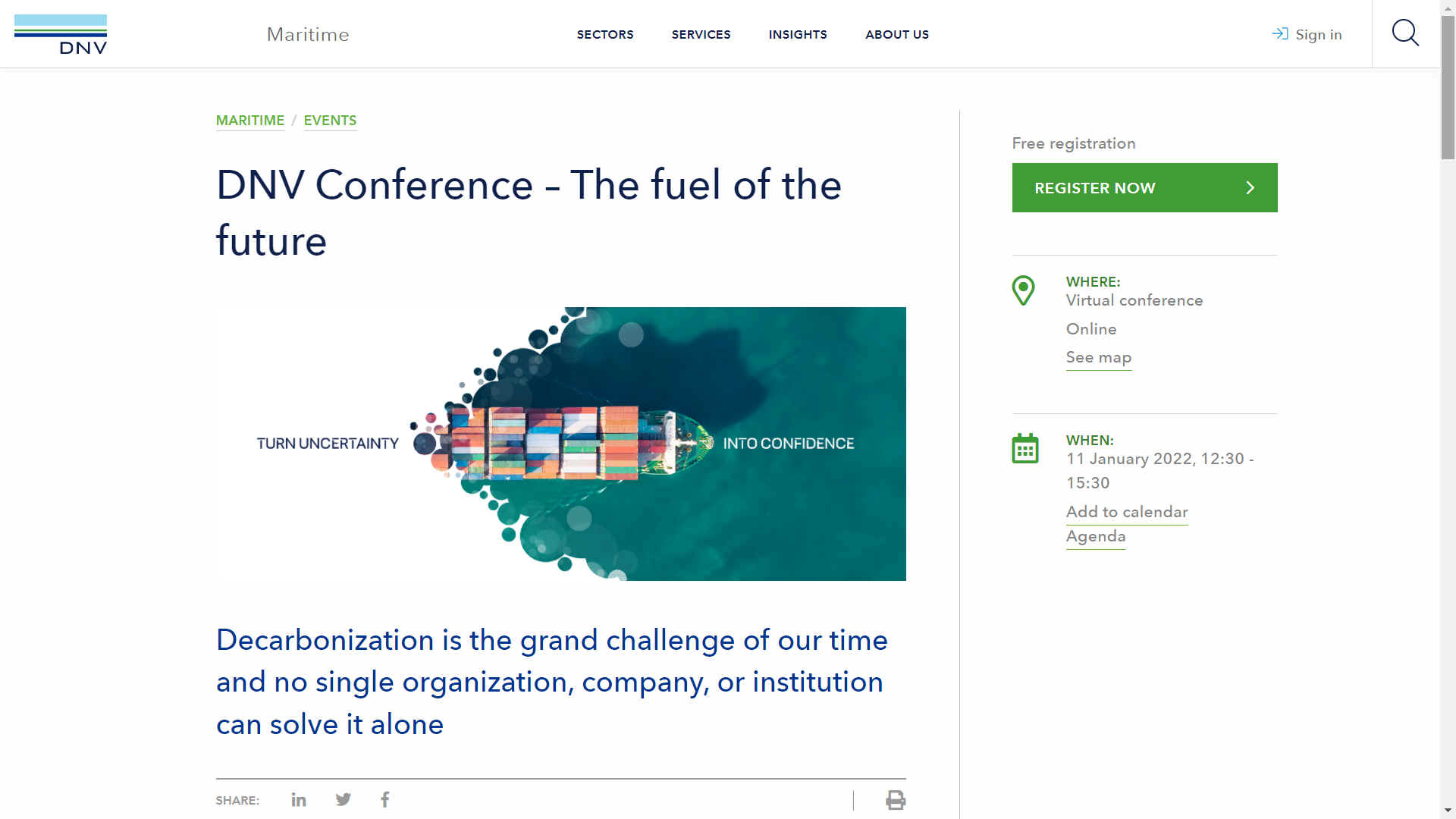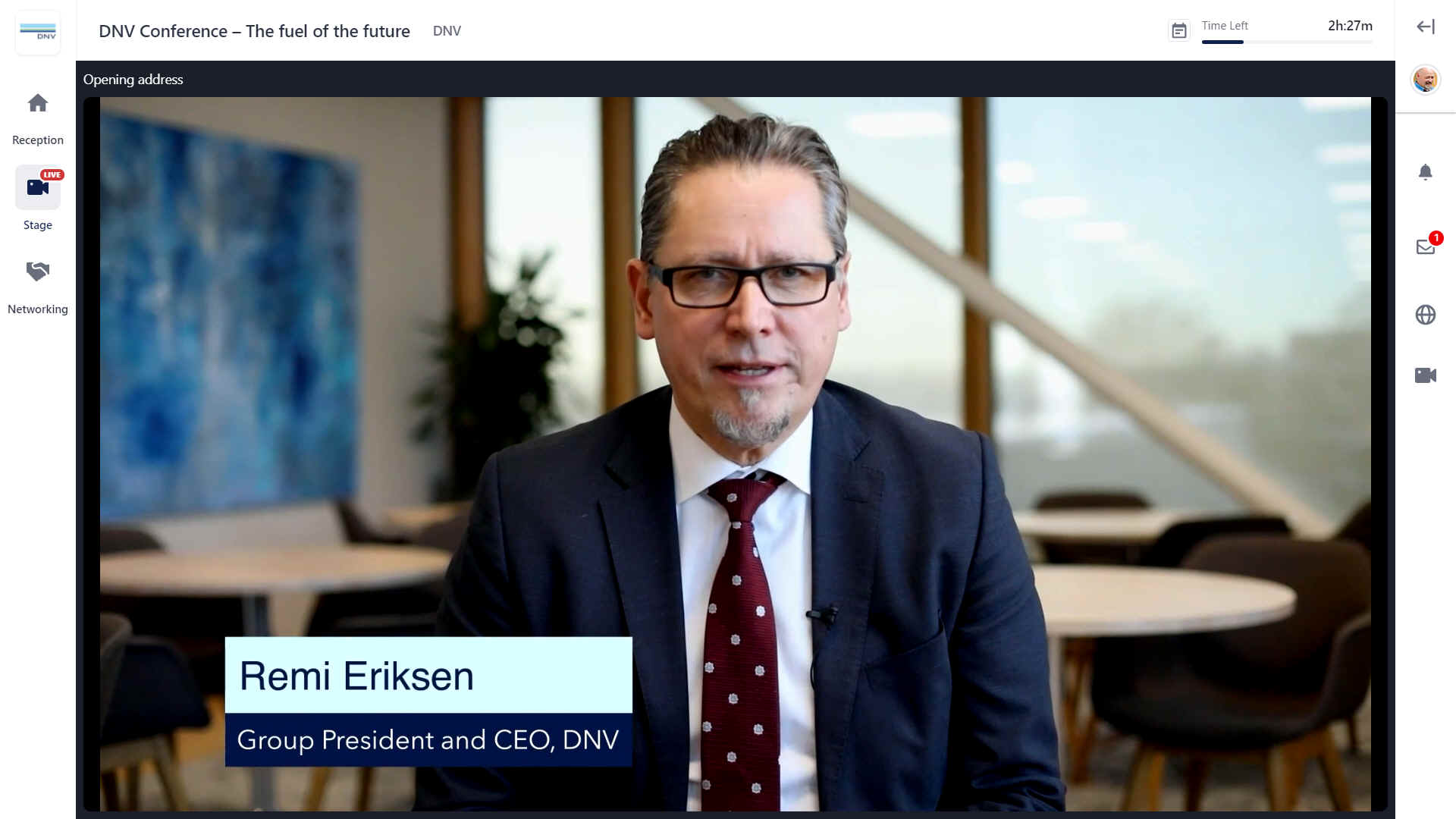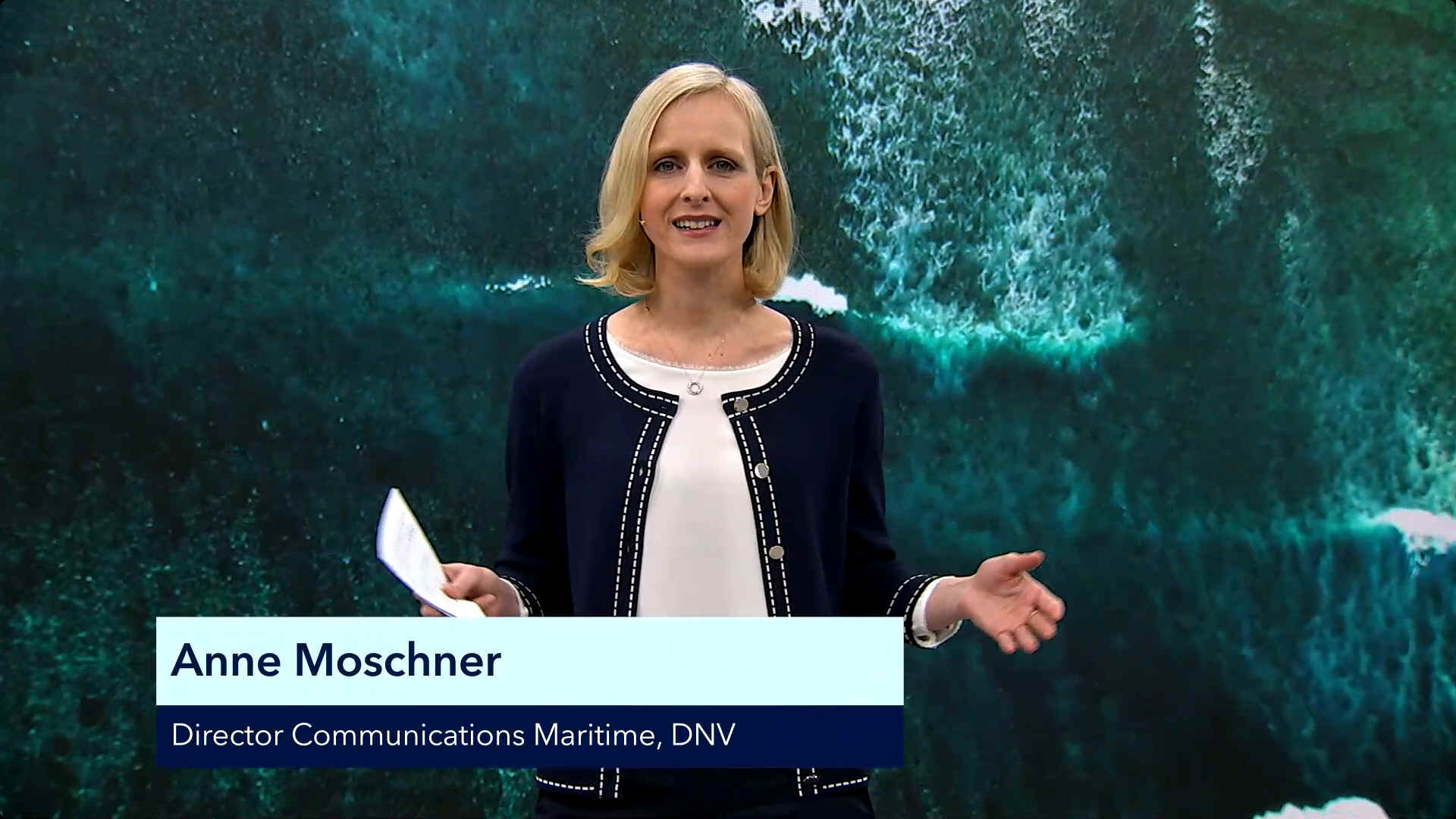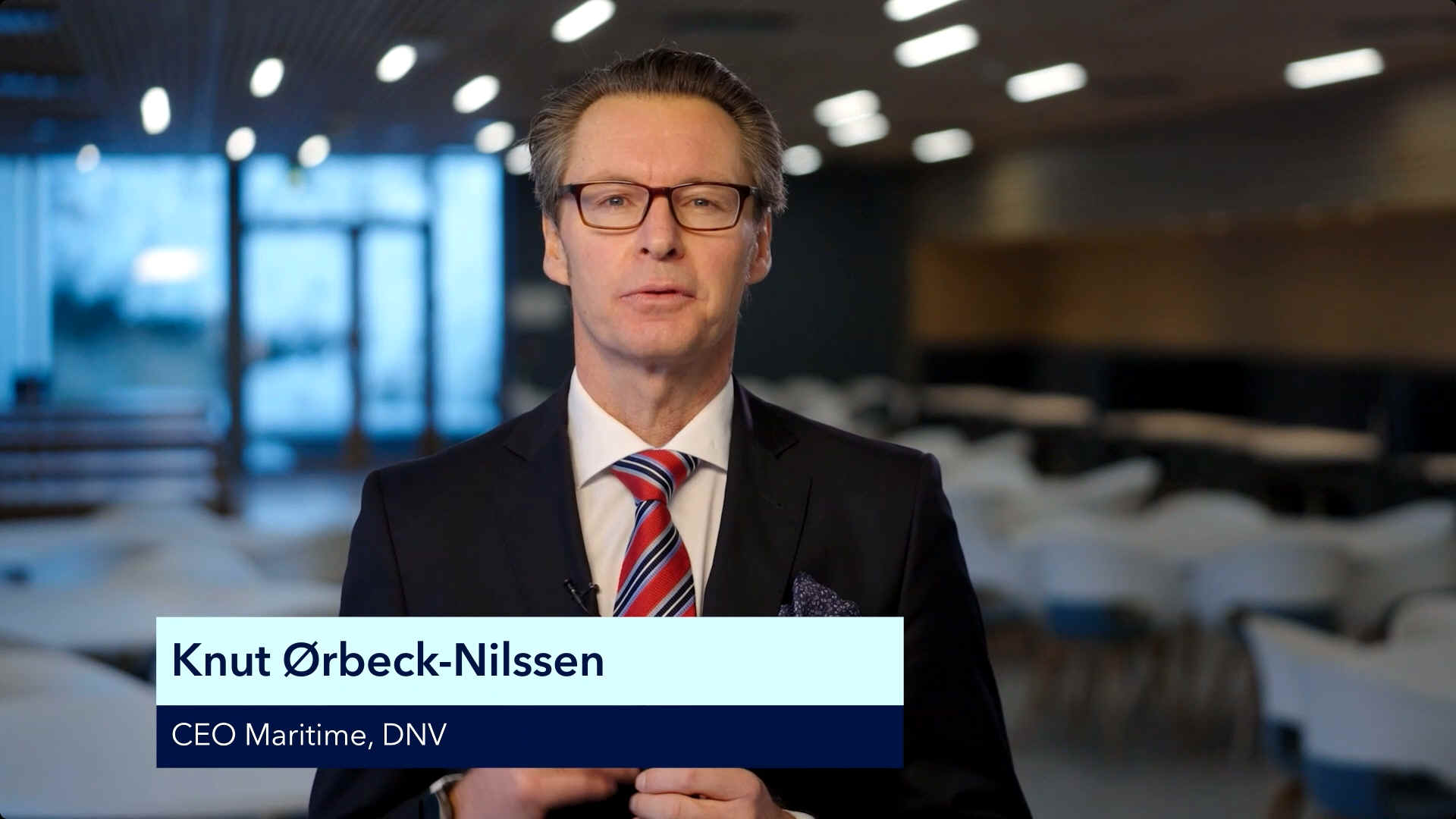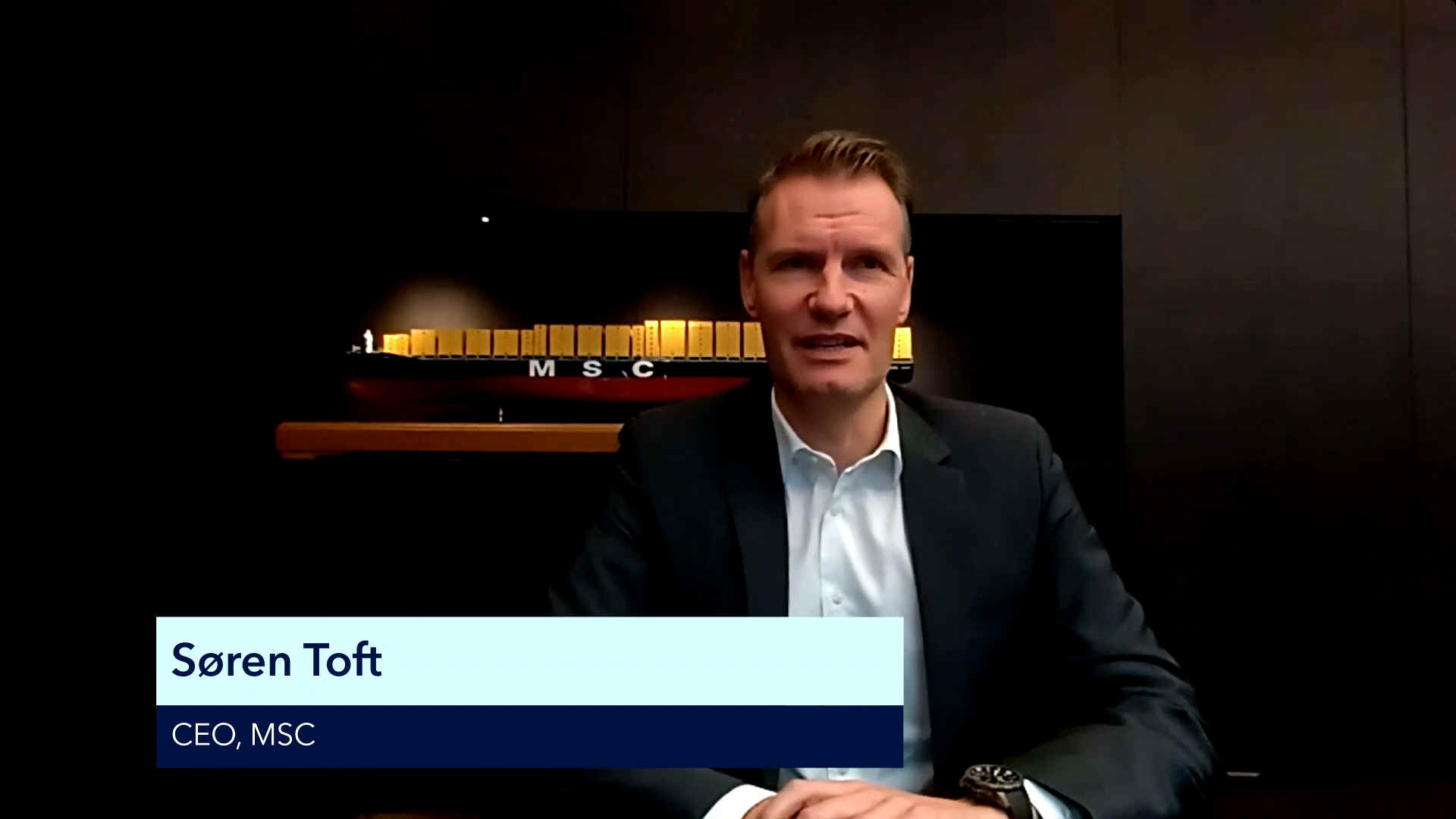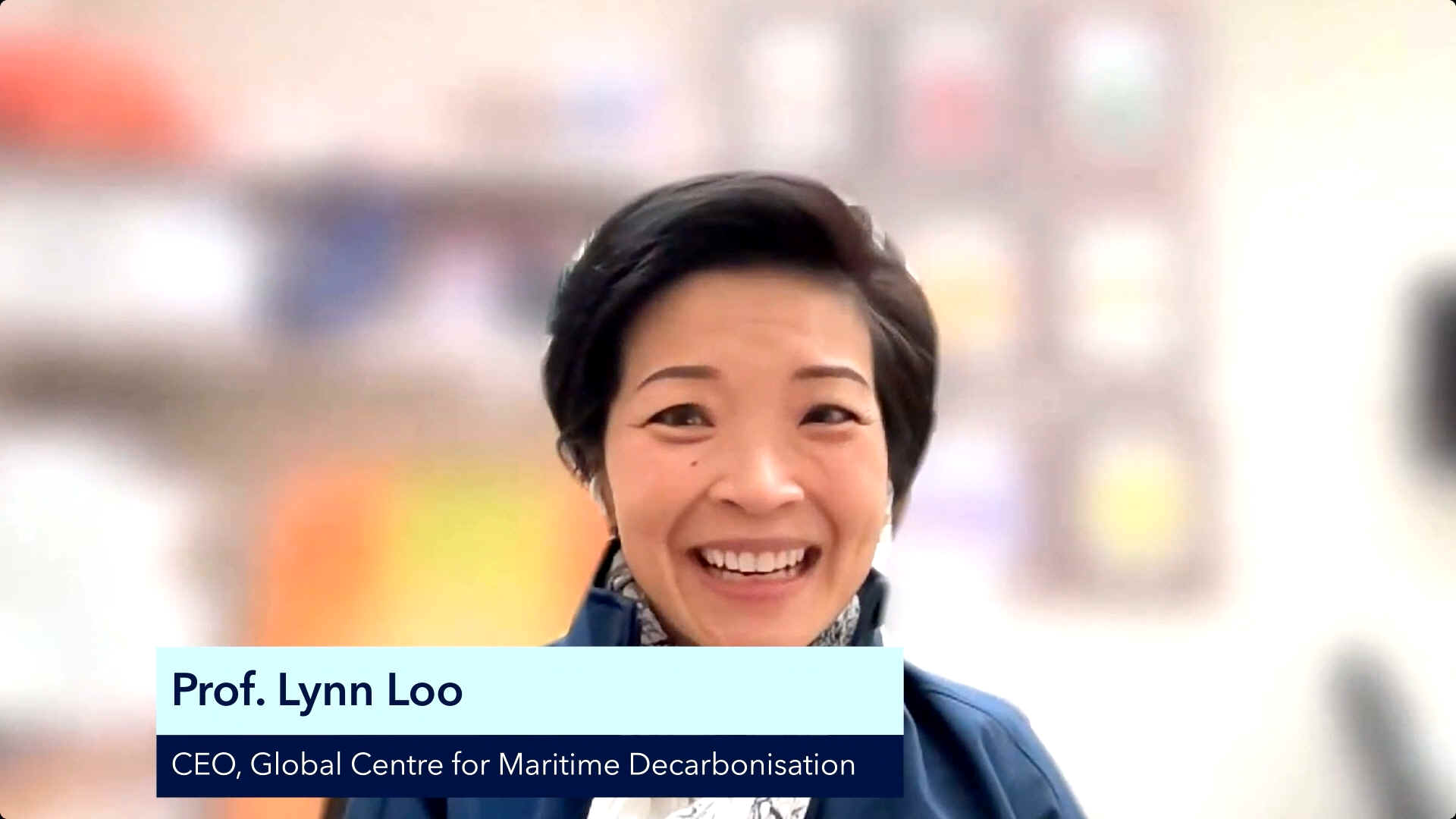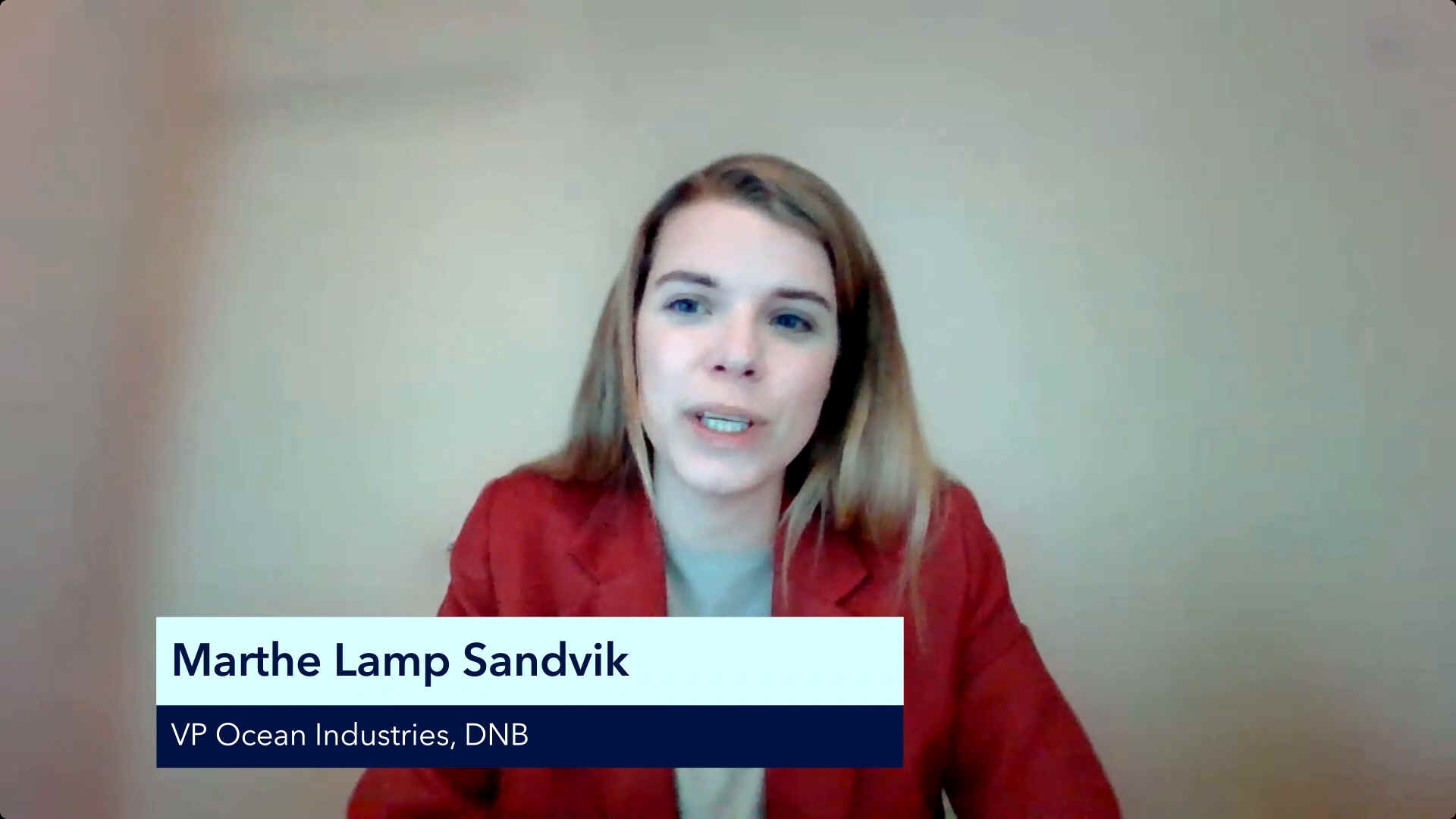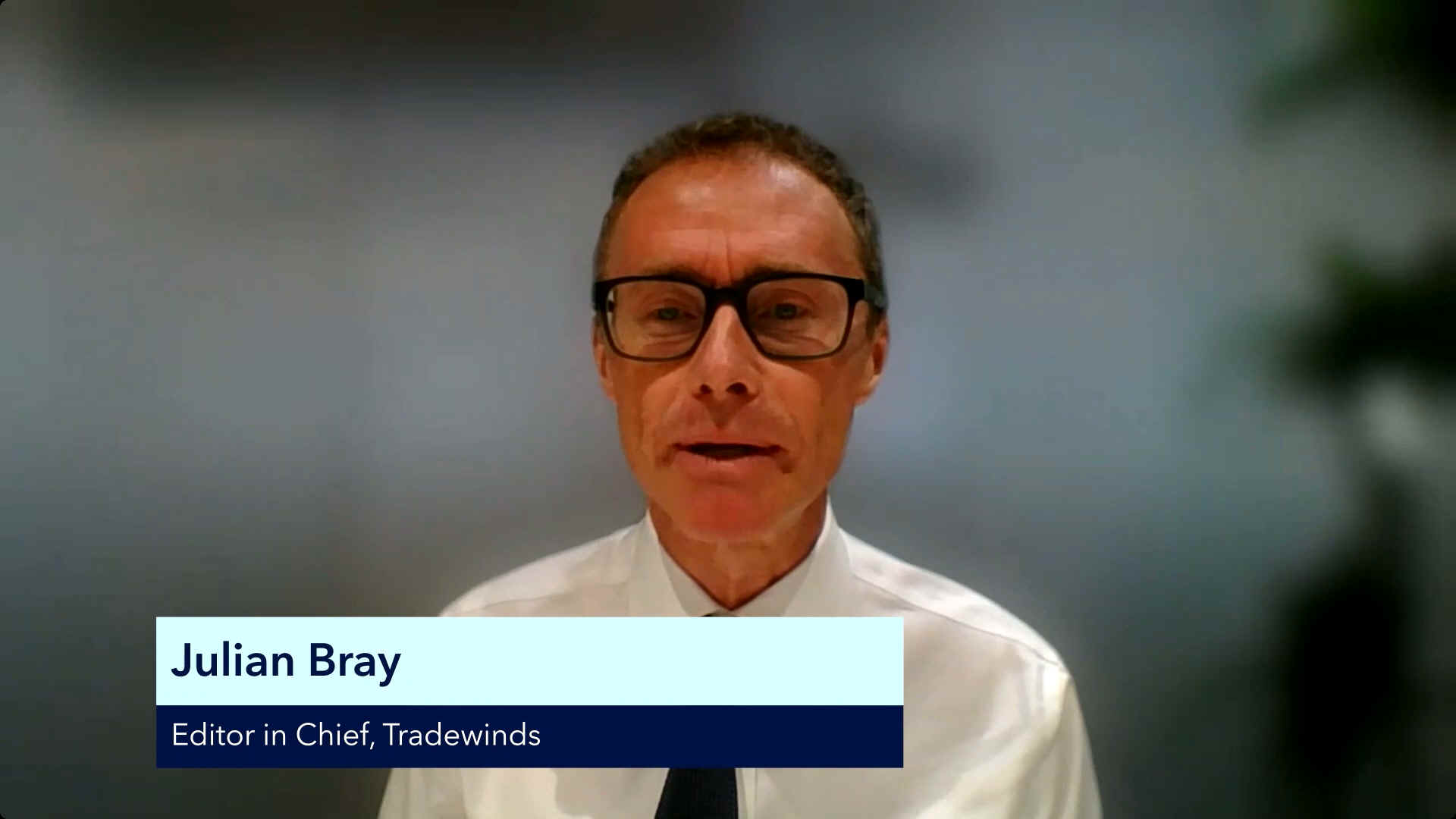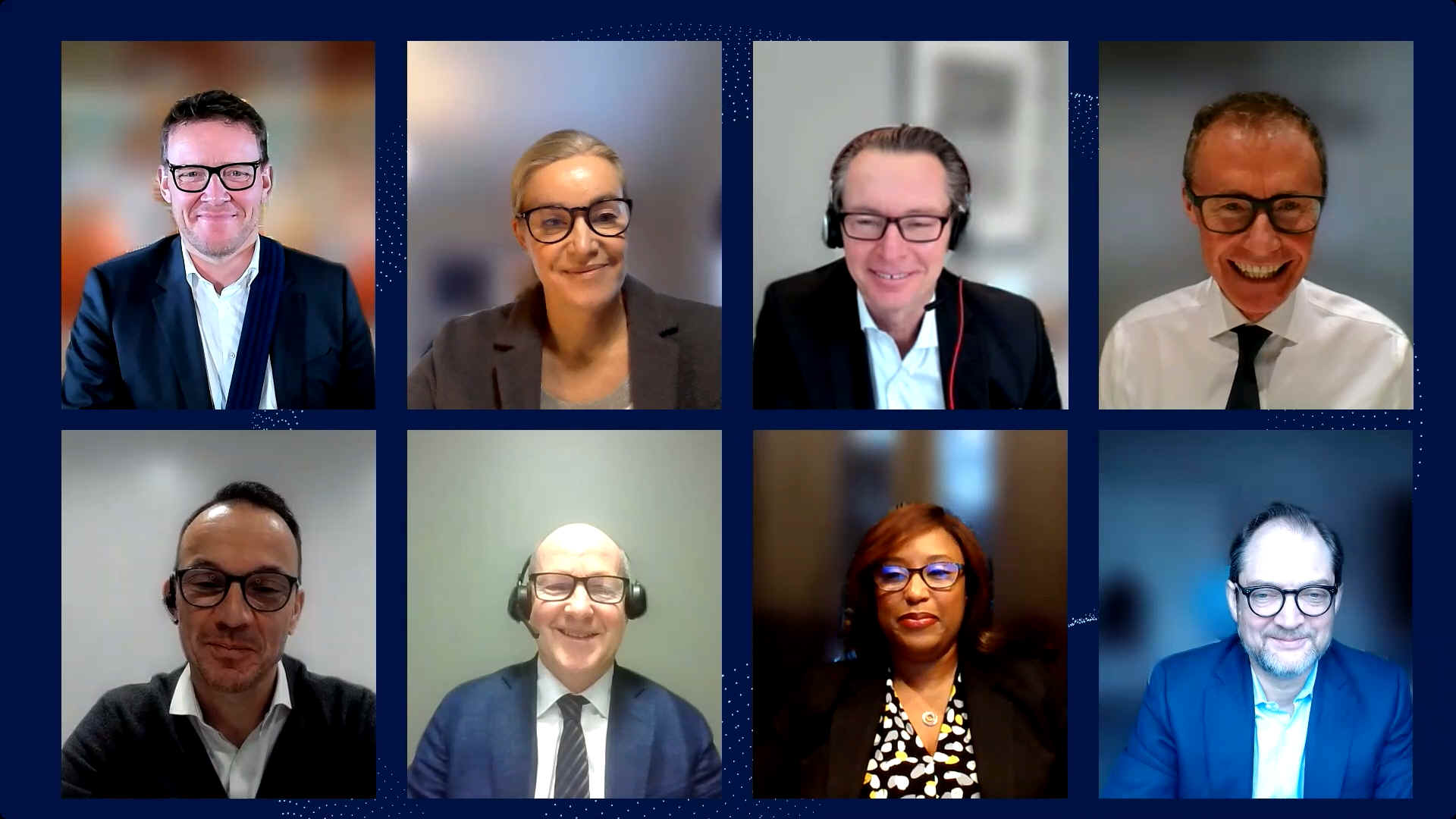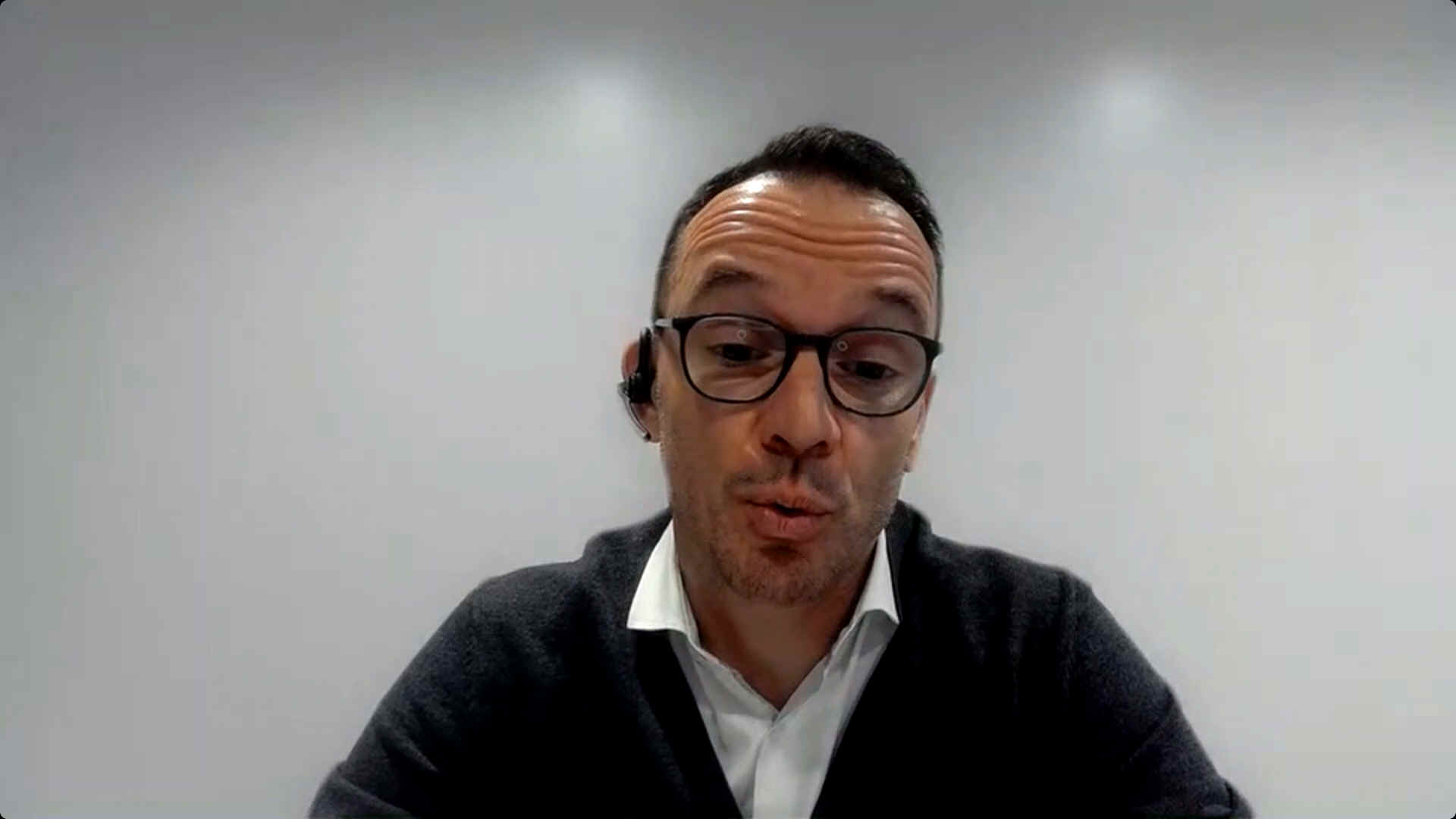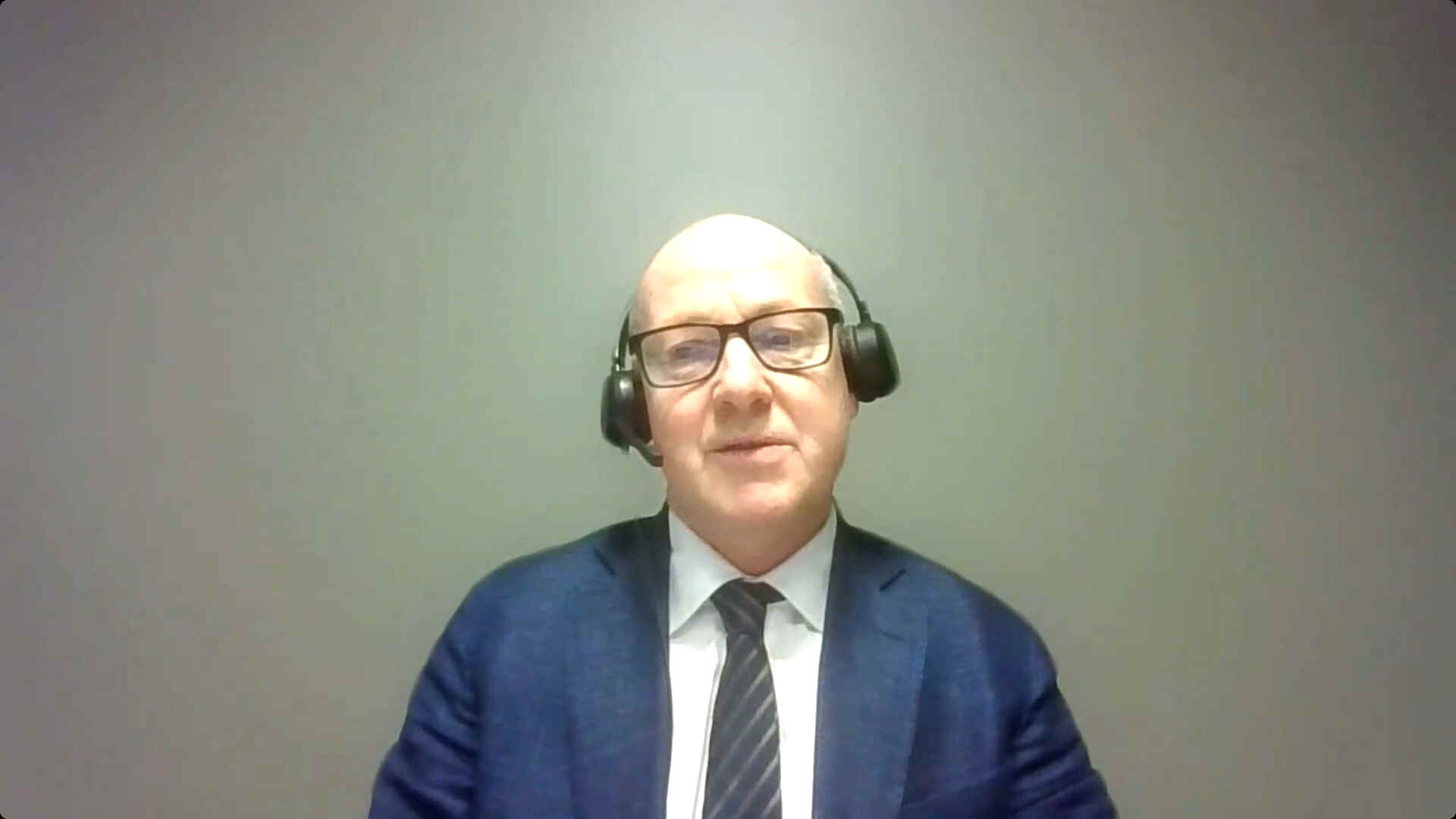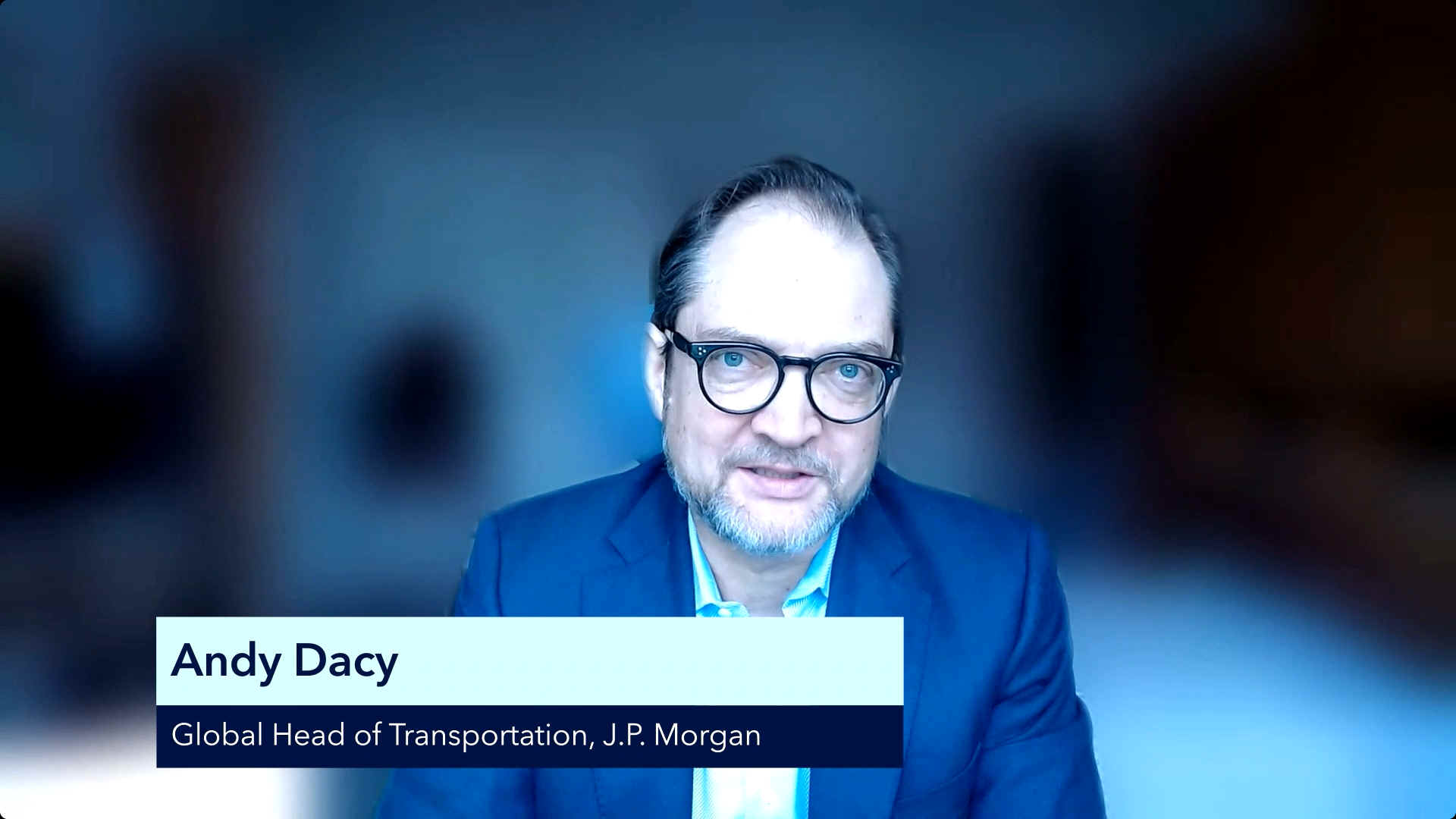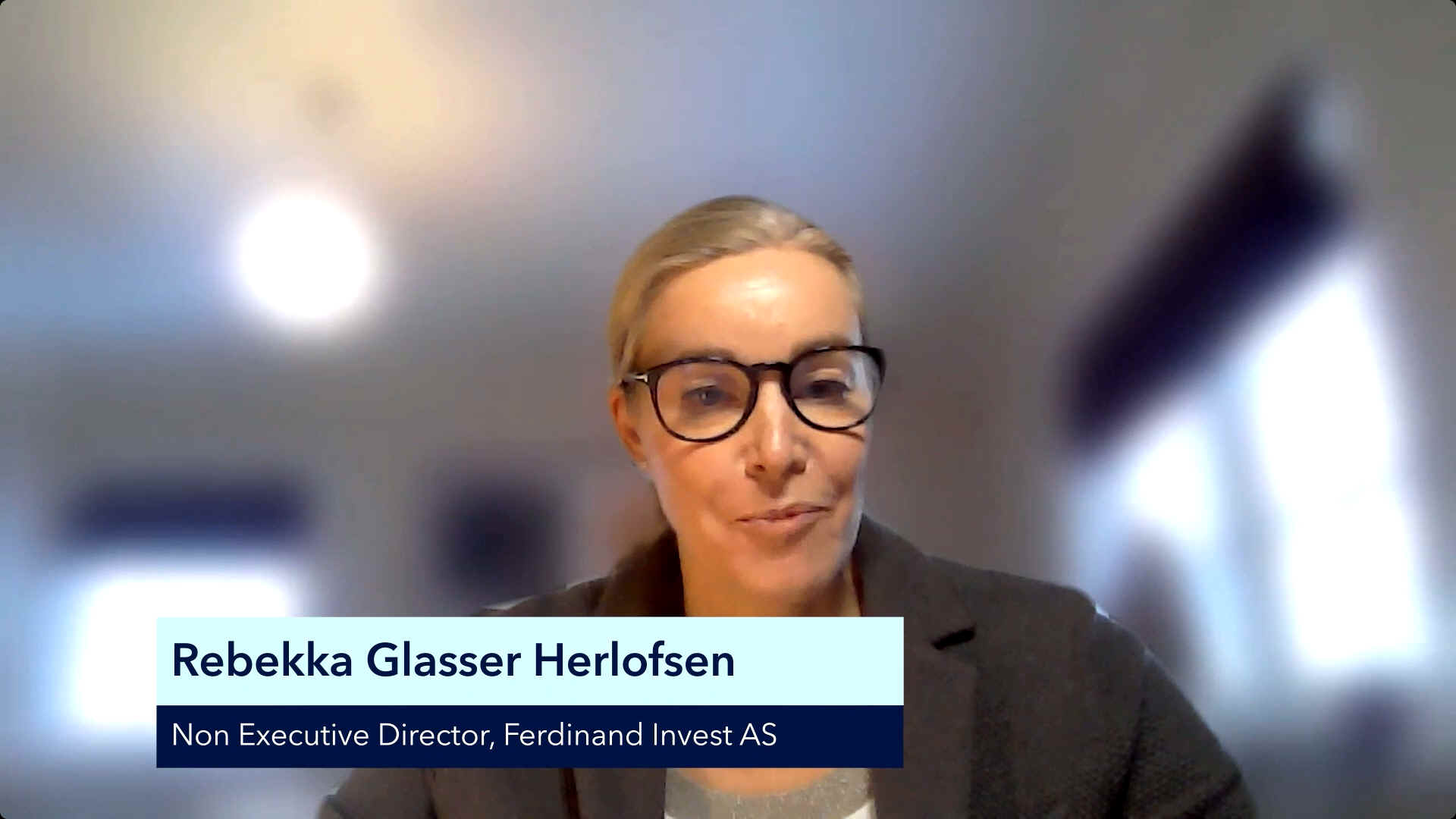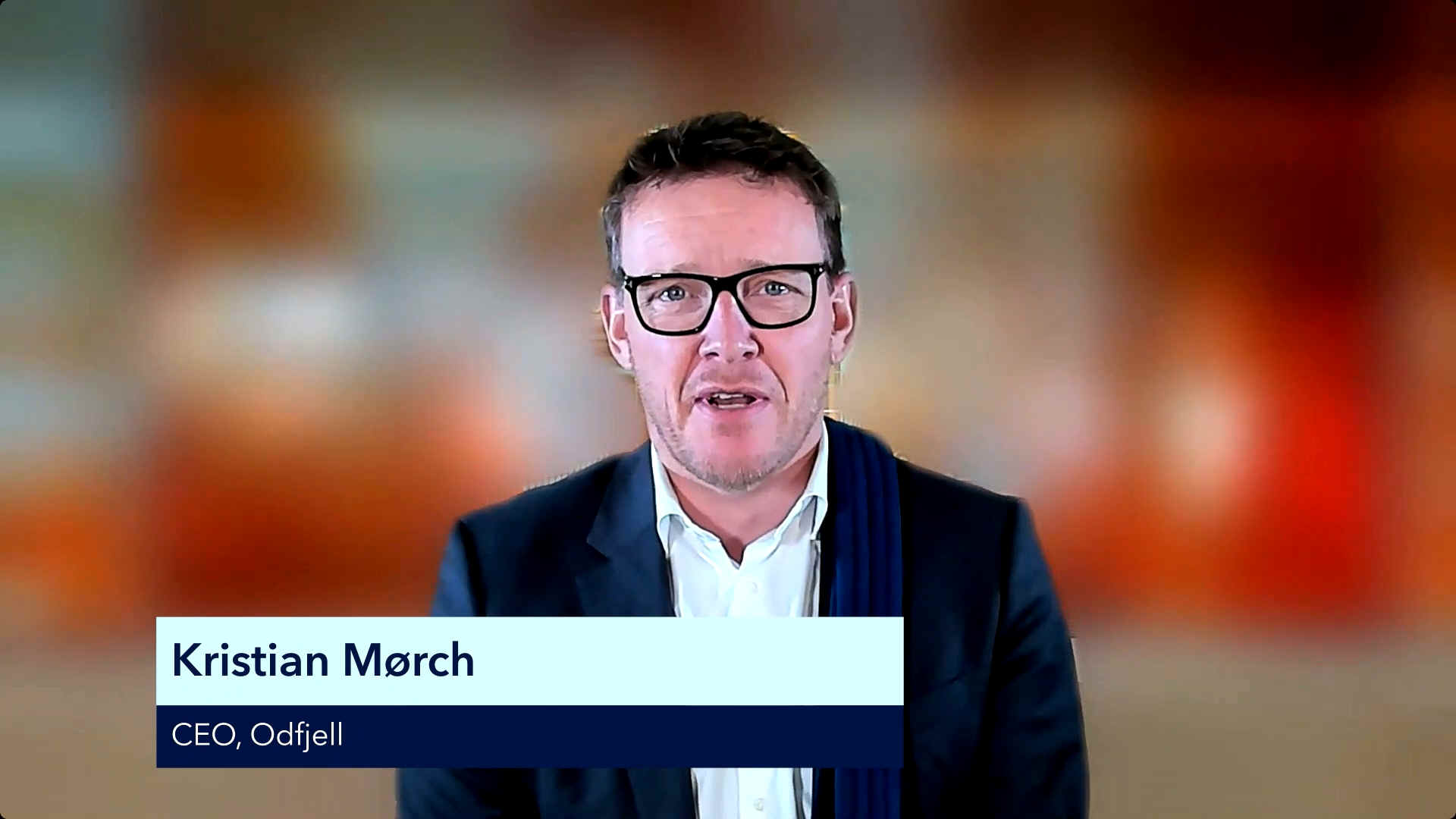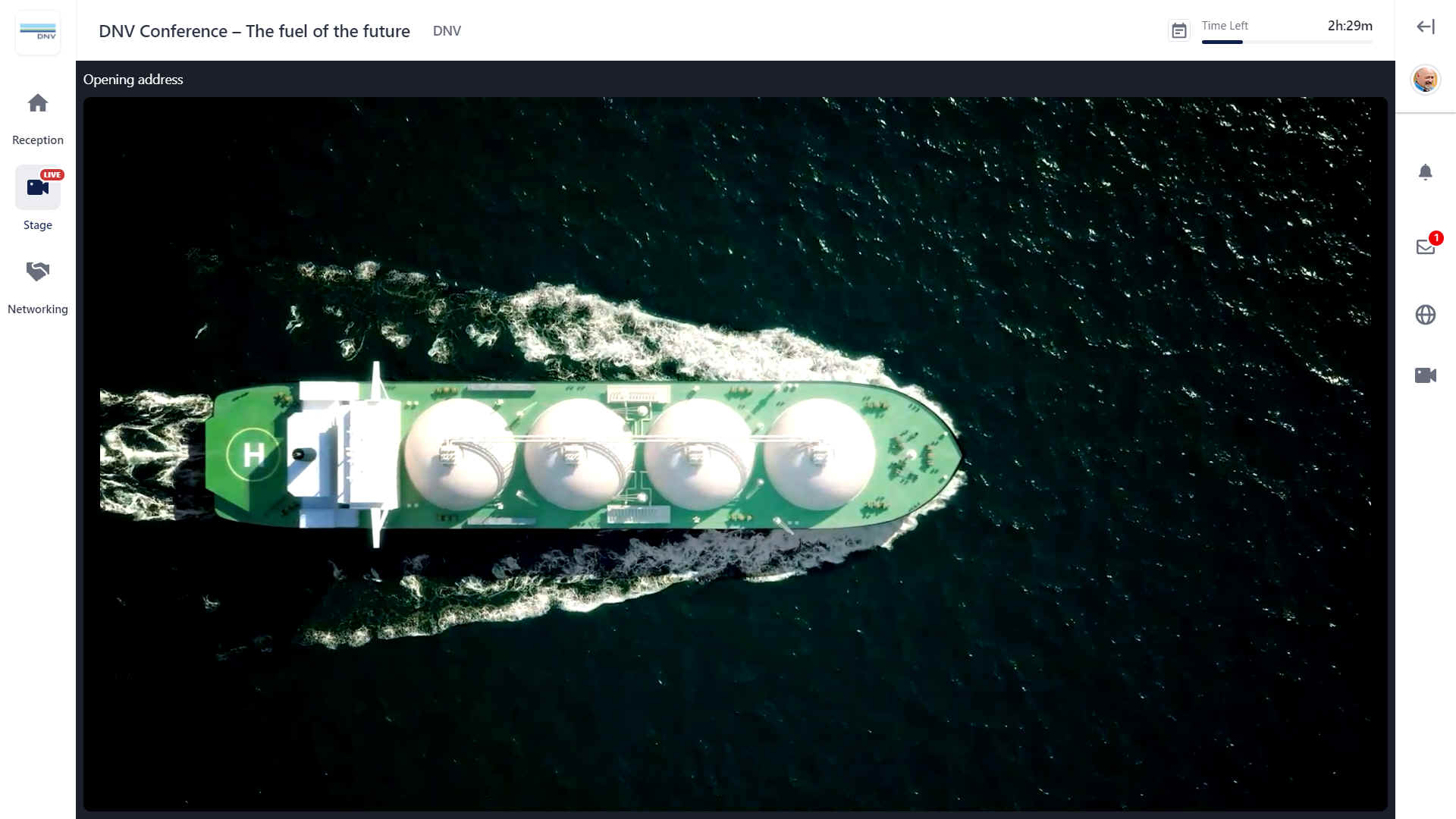|
DNV - FUELS OF THE FUTURE - CONFERENCE 11 JAN 22
Please use our A-Z INDEX to navigate this site or return HOME |
|
|
|
|
|
|
|
|
Not waiting for the grass to grow under their feet, DNV got off to a flying start in 2022. Around 5,000 delegates attended this online conference in January aimed at bringing together industry leaders from across the entire shipping and logistics value chain, to explore how to unlock the power of collaboration for a more sustainable global maritime industry.
Encompassing more than just research, but leaning toward applying known technology today, with the assistance of the financial world, where investments are necessarily repayable over long periods, before turning the risk-corner into profitability.
Decarbonization
of the shipping world is thus one of the grand challenges of our time and no single organization, company, or institution can solve it alone.
This also applies to all countries. All nations need to row together on this
one.
Event date: Tuesday, 11 January 2022
CLEANER OCEAN FOUNDATION
The event was attended by a volunteer for the Foundation, Nelson Kay, a keen advocate of environmentally friendly marine transport - and long time experimenter of solar powered electric designs. Our delegate used the speed networking facility to make contact with several new potential allies in the fight against global warming. In particular we met those in charting, a naval architect and a company that is involved with methanol - where it is by no means certain what form the energy for the Elizabeth Swann will take, or if the vessel might become a floating test rig, with interchangeable fuel tanks. Meaning, the sleek hybrid trimaran might test LH2, methanol or ammonia. Of course, at different times and events.
If anyone is interested in this project, we would very much like to have the vessel in the water for 2024, the 150th anniversary of Jules Verne's hydrogen prediction. If we can also manage to a world navigation in under 80 days, we feel sure that Jules Verne fans around the world would will appreciate the accolade.
The 'Swann' project may be commercially sponsored and branded, with philanthropic contributions welcome. We will have space on the hull available for partners and associates, and on the dedicated website - that will be suitably developed for media saturation, and entertainment value, as appropriate. The Foundation is more of a 'Do-Tank,' than a 'Think-Tank.'
|
|
|
|
|
|
PRESIDENT & CEO DNV - Remi Eriksen is the group president and chief executive officer of the world famous classification society. As yet there are no hard and fast rules for hydrogen fueled vessels, though those in existence for LNG, provide useful guidelines. DNV is at the forefront of the transition to climate change, helping to drive technology forward to meet the challenges.
13:00 - Opening address
Remi Eriksen - Group President and CEO, DNV
COMMUNICATIONS - Anne Moschner did a splendid job of introducing the speakers, with a brief outline of the aims of the event, and interaction with many of the speakers. Thank you Anne, you smooth talker.
13:05 - Event opening
Anne Moschner - Director Communications Maritime, DNV
MARITIME DNV - Knut Ørbeck-Nilssen is the chief executive of the marine division of DNV. He gave us an insightful overview of the companies hopes for the challenges ahead for shipping. He was also a panelist on: Unlocking the power of collaboration to secure a sustainable future for shipping, one of the main themes of the event. See below.
13:10 - Keynote: Collaboration - the real fuel of the future
Knut Ørbeck-Nilssen - CEO Maritime, DNV (Exhibiting SMM, Hamburg, September 6 - 9 2022)
CEO MSC - Soren Toft gave a superb overview of MSC's take on how we might transition from diesel, to LNG, to other emerging fuels, with an emphasis on all pulling together to achieve true zero emissions at fleet scale. Our attention was drawn to the running efficiency of hulls, low drag and cleaning, that should not be neglected. Then it was explained that the cost of change would need to be passed to the cousumer, through the supply chain. But, crucially, the chief executive was not dismissive, or negative. The concern of all fleet operators is the lifespan of a ship, that had to be factored in over 20-25 years. Hence, the need to go from talking about change, to getting on with it. Finally, as to incentives, it is down to the policy makers to think of carbon taxes, etc., the aim of which would be to create a fund to drive research and development forward.
MSC Mediterranean Shipping Company is a global business engaged in the shipping and logistics sector. Present in 155 countries, MSC facilitates international trade between the world’s major economies, and among emerging markets across all continents.
13:20 - Keynote: A shipowner's perspective
Soren Toft - CEO, MSC
CEO GLOBAL CENTRE MARITIME DECARBONISATION - "If you want to go fast, go alone. If you want to go far, go together" Prof. Lynn spoke of ammonia bunkering and the supply chain, safety measures - leading to piloting of the delivery of molecules to the end user. Points raised were differing regulations, needing harmonization across the board. In the words of Nelson Mandela: "Igether." To develop the solutions we need to bring all the factors together, suppliers, technology and operators. Looking at what has failed and what works, so that we can transition faster.
The Global Centre for Maritime Decarbonisation (GCMD) was formed on 1 August 2021 with funding from the Maritime and Port Authority of Singapore (MPA), and six founding partners, namely BHP, BW, DNV Foundation, Eastern Pacific Shipping, Ocean Network Express and Sembcorp Marine. Located in Singapore, GCMD was set up as a non-profit organisation to support decarbonisation of the maritime industry to meet or exceed the International Maritime Organization's (IMO) goals for 2030 and 2050.
AMMONIA
STUDY - Ammonia is one amongst the slate of alternative fuel solutions available. With rapid deployment of renewable electricity, ammonia can potentially be produced at scale when green hydrogen is widely available. However, supply chain-related gaps need to be addressed before green ammonia can be safely used by the maritime industry. These include global green production capacity and supply, bunkering standards and procedures around safety, operations & the environment, bunkering infrastructure, the availability of ammonia-fuelled vessels and its overall impact to the marine environment.
VP OCEAN INDUSTRIES DNB - Marthe spoke on transition and funding from a financiers perspective, including relief for borrowers as to draining micro management negatives. Hopefully, helping developers to weather the R&D storm - a refreshing take on banking. On the collaborative initiative between Norway's leading role and the Green Shipping Programme, transitioning from internal innovation to open innovation. Looking to an infrastructure initiative that is in the pipeline. The other focus was on collaboration prioritization over a perfect world. In other words, grasping the bull by the horns, and actually taking solutions that are workable today and getting on with it, rather than holding out for an as yet mythical ideal. Finally, when looking at these green fuels, we need to concentrate on producing the energy sustainably, with support for the generation and conversion.
DNB has served the maritime industry for more than 50 years. Shipping, Offshore & Logistics are priority areas within DNB’s international strategy, serving the maritime industry globally through presence in New York, London, Singapore, Oslo, Bergen, Shanghai and Athens:
Dronning Eufemias gate 30, 0191 Oslo. Tel: +47 915 04800
8th Floor, The Walbrook Building, 25 Walbrook, London, EC4N 8AF UK. Tel: +44 20 7621 1111
13:40 - Interview: Insights from collaboration's enablers Speakers: Prof. Lynn Loo
- CEO, Global Centre for Maritime Decarbonisation
TRADEWINDS - Julian Bray was the chair of the panel conversation, moving the discussion along nicely, and looking at some of the less obvious problems the transition to zero carbon shipping, might bring. He mentioned about a theoretiacal €100,000,000 grant, and what is needed to succeed with an application.
THE PANELISTS LEFT TO RIGHT - Kristian Mørch, Rebekka Glasser Herlofsen, Knut Ørbeck-Nilssen, Julian Bray
CARGILL OCEAN TRANSPORT - Jan Dieleman was of the view that ambition levels were higher, though lifecycle emissions should be considered alongside simple emissions per ocean mile. Agreed it was a complex issue, should not allow Poseidon project to dictate and is not beginning and end all. Did not think carbon capture was a thing worth pursuing, but loved the idea of wind power. On which we agree entirely.
Cargill operate in the areas of food, agriculture, finance and industrial products. They have 155,000 employees working every day to nourish the world in a safe, responsible, sustainable way. They are a leading provider in ocean freight with a sizable fleet and global footprint to provide more choices for getting the right vessel to the right port for their customers.
Amsterdam, the Netherlands (Tel. +31-0-20-500-60-00)
SHELL MARINE DECARBONISATION - Melissa Williams is the Vice President of Shell as to greening shipping. Shell are looking at all fuels, most especially with a view to handling and safety. With ammonia perhaps, being one of the most testing potential fuels. Need to get the entire supply chain in order, about which she was confident it would eventually happen. She would like to see a project that actually used ammonia as a real demonstration project. Then there is energy efficiency and alternative fuels.
FUTURE PATHWAYS - Shell believes liquid hydrogen to be advantaged over other potential zero-emissions fuels for shipping, therefore giving a higher likelihood of success. Clean hydrogen, produced either from renewable electricity or using carbon capture and storage, can be expensive to produce today. But it is also attracting interest as a potential fuel for power and land-based transport and as a possible feedstock for industry. These other ectors could help develop and pay for some of the production and distribution infrastructure needed for hydrogen’s use as a shipping fuel. The shipping
sector should stand ready to capitalise on that development. The properties of hydrogen are well understood and although there is much work to do, Shell considers that safe designs can be developed for marine use. As a fuel, it can be switched in to use with ‘fuel-agnostic’ fuel cells which have been developed using LNG first.
MINISTRY OF CLIMATE & ENVIRONMENT - Sveinung Oftedal gave us some insight into contracts, to be able to respond to transition.
Norway’s target is to be a low-emission society by 2050. It will be a challenging task to achieve this, but the process will also open up opportunities. In the maritime sector, there will be opportunities for green value creation both within and outside Norway’s borders. The Government will take steps to encourage the emergence of Norwegian winners during the green transition in the shipping sector.
Since 2015, Enova has allocated more than NOK 1.6 billion to projects for different kinds of vessels.
Of this, NOK 1.5 billion was for projects concerning vessels fitted with batteries or charging facilities
for low- or zero-emission vessels using battery technology. The Government
has yet to consider whether to introduce incentives for zero- and low-emission ships in the Norwegian ship registers (NIS and
NOR).
14:10 - Panel Discussion: Unlocking the power of collaboration to secure a sustainable future for shipping
J. P. MORGAN TRANSPORTATION - Spoke on collaboration between market players in LNG with Shell, for inland waterway barges - that might also be battery powered. Taking from development to implementation, with the industry assessments being inconsistent, so being in stage one of a multi-stage process. He would like to see carbon and methane capture projects.
Long-term investors have always faced the challenge of reaching high return targets while maintaining appropriately diversified and liquid asset allocations.
Today - with an increasingly uncertain equity market, growing concerns about rising inflation, and interest rates at or near all-time lows across the developed
world - a traditional, liquid, market-focused 60/40 portfolio may no longer be able to meet the needs of return-focused investors. Fortunately, the expansion and diversification of alternative asset allocations, particularly in areas outside the more common private equity, real estate and hedge fund sectors, offer the prospect of improved investment performance.
JPMorgan Chase & Co. Tel. +1 212 270 6000 E. jpmam.info@jpmorgan.com
FERDINAND INVEST AS - Rebekka Glasser Herlofsen, joined the panel to inject some practical experience as to projects. She was pleased to see so much effort to bring things together. But not at a level where accounting can report accurately such as to reflect carbon emission reductions.
Astrids vei 10A, OSLO, 0276, Norge.
ODFJELL CEO - Kristian Morch, spoke of optimization and total cost of the cost of transportation of goods. Not just the financial result, but also the cost to the environment. He explained that it was a very complex issue. Do we build for a combustion engine, fuel cells, or what. Agreed that reporting is a challenge, as to what lies behind it - as to reaching targets. He would invest in research into fuel cells, as an alternative to the internal combustion engine.
The Odfjell Group is one of the world leaders in the global market for seaborne transportation and storage of chemicals and other specialty bulk liquids. Established in 1914, Odfjell pioneered the development of the chemical tanker trade in the 1950s and the tank storage business in the late 1960s. Odfjell have some 2,294 employees, broken down into 1,632 seafarers, 292 terminal employees and 370 shipping employees on shore. They operate around 80 ships from 14 offices around the world, with five terminals at key strategic locations: 470 tanks and 1.3 million cbm storage capacity. In 2020 their gross revenue was USD 939 million with total assets of $2,220 million.
ODFJELL: P.O. Box 6101 Postterminalen, Conrad Mohrsv. 29, 5892 Bergen, Norway. Tel. +47 5527 0000 E. mail@odfjell.com
15.10 - Wrap-up of the day and closing
Knut Ørbeck-Nilssen
- CEO Maritime, DNV
15:15 - Speed networking
LINKS & REFERENCE
https://www.gcformd.org/ https://www.dnb.no/en/corporate-and-institutions/industries/shipping.html https://www.shell.com/energy-and-innovation/the-energy-future/decarbonising-shipping.html https://am.jpmorgan.com/jp/en/asset-management/institutional/insights/portfolio-insights/alternatives/the-role-of-core-transportation-in-institutional-portfolios/ https://www.odfjell.com/ https://hopin.com/events/dnv-conference/registration
|
|
|
ZEWT - SOLAR + HYDROGEN: Solar power is a proven means of traversing the oceans, but slowly. We aim to improve the conversion efficiency from sun and wind to propulsive thrust - using a complimentary trimaran hull design, with hydrogen hybrid potential, and up to 4000nm on hydrogen alone. As an experimental vessel, the design is modular, to allow bolt-on modification to the rig. Including swapping between other hydrogen based fuels, including ammonia and methanol, as development continues. The focus is on renewables and green hydrogen, for a sustainable, and truly circular economy. The Elizabeth Swann is an experimental testbed, with the Jules Verne Trophy event, being a logistics challenge, as much as a nautical adventure. Nelson Kay, an ocean elder, is booked to attend this event for COF.
|
|
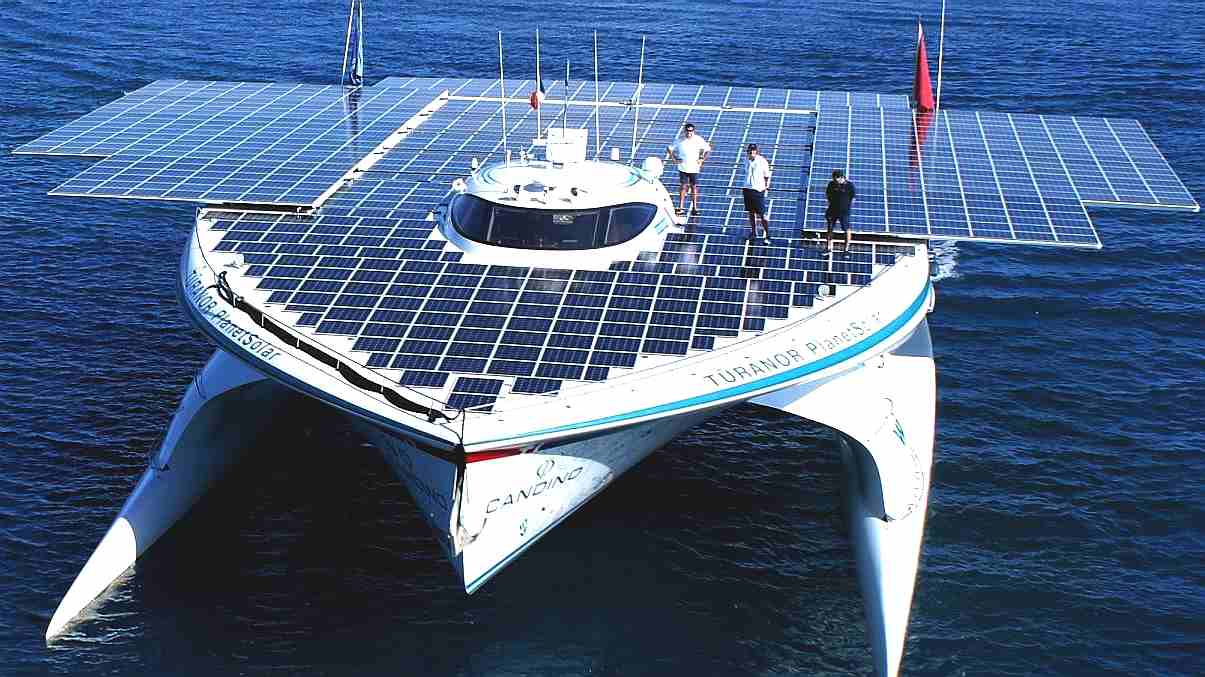
|
|
|
|
|
|
BLINKERED - Solar energy, harvested and used directly does not seen too appeal to shipping magnates, even though it might provide a significant boost to running a ship as a ZEWT. The Foundation is keen to develop this theme as far as is practical. The PlanetSolar, pictured above is purely solar powered, circumnavigating the globe in 2012, to prove a point.
Please use our A-Z INDEX to navigate this site
This website is Copyright © 2022 Cleaner Ocean Foundation Ltd, an equal opportunities company. This website is carbon friendly, using less energy to load on average per page via simplicity & picture optimization. The same may not apply to third party links.
|
